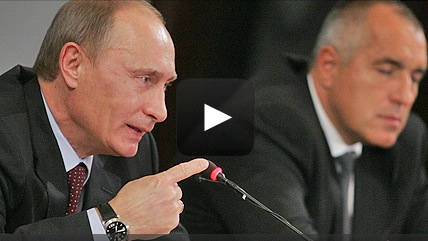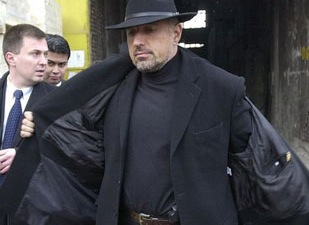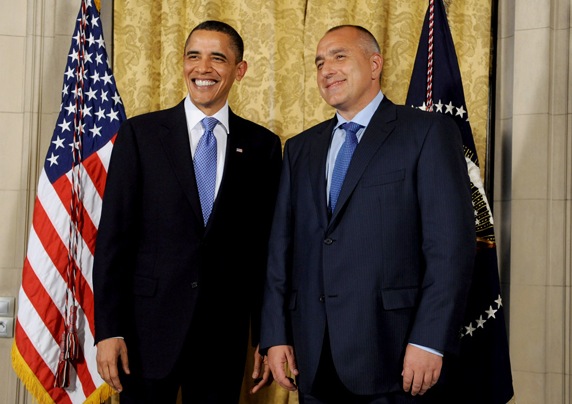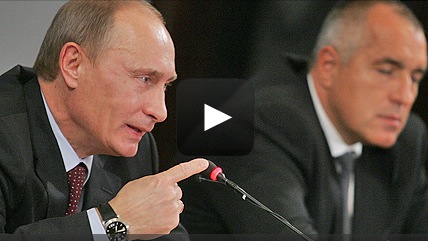
A diplomatic cable of the US embassy in Sofia, dated October 2, 2008, has been revealed on WikiLeaks, focusing on Bulgaria's energy dependence from Russia.
The report titled "BULGARIA AND THE ENERGY KNOT: SCENESETTER FOR OCT 7 VISIT OF SPE GRAY," has been sent by then US Ambassador in Sofia, Nancy McEldowney to Boyden Grey, at the time Special Envoy for European Affairs and Special Envoy for Eurasian Energy at the Mission of the United States to the European Union, ahead of his visit to Bulgaria.
The Bulgarian dependency is described by the Ambassador almost pornographically with the following words: "But the cartoon strip portraying a passionately eager Bulgaria in bed with the muscle bound duo of Gazprom and Lukoil is only partially true -- it is a tryst driven less by passion and more by a perceived lack of options."
The cable is revealed after the Bulgarian Government revoked the license of one of the "muscle bound lovers": the local refinery of the Russian oil giant Lukoil, who was forced to halt operations for at least a month and a half.
Тhe Director of the Bulgarian Customs Agency, Vanyo Tanov explained that the refinery cannot operate without the required electronic measuring devices Lukoil failed to install in its storage facilities, and can deal only with the fuels already outside the plant.

Bulgarian PM Boyko Borisov refuted yesterday the Wikileaks revelations about his past ties to organized crime, metamphetamines traffic and his dependence from a shady businessman from Lukoil.
"I don't read Wikileaks" - he said before the media in The Hague, Netherlands, on 26th of May, where he opened the 7-th international meeting of Bulgarian media, organized by the Bulgarian news agency BTA.
Asked by journalists about his comment on the cable content, published by the Bulgarian web site Bivol.bg, the local Wikileaks partner, Borisov acknowledged he phoned the US Ambassador James Warlick, who said that the Wikileaks publications are "based on unconfirmed sources and it was futile to comment on them".
"As far as I know, they have not published anything positive about anybody yet. They also cite tabloids publications and comments of various political parties," Borisov said. "I don't read tabloids" - he concluded.
Later the same day, the US Embassy published a statement saying that "It is important to keep in mind that diplomatic cables are often preliminary and incomplete analyses of international affairs, and should not be seen as official representations of U.S. foreign policy"
US Ambassador to Sofia, Jonh Beyrle wrote the said cable on Borissov on May 9, 2006. The report’s confidentiality level is listed as SECRET/NOTFOR (NOT FOR FOREIGNERS), only one level below the highest TOP SECRET level, not available to Wikileaks.
The cable is one of the few from a total of 978 reports sent from Sofia, that have been checked and approved simultaneously by the Embassy’s political, military and security advisors, not just Ambassador Beyrle.
Borissov described himself as "Bulgaria's biggest asset"

"We must continue to walk a fine line between being used by Borisov's publicity machine and alienating an exceptionally popular and seemingly pro-American politician who may emerge as Bulgaria's next leader. In other words, we should continue to push him in the right direction, but never forget who we're dealing with."
This is the conclusion of a diplomatic report dedicated to now Bulgarian Prime Minister, Boyko Borisov, sent by former US Ambassador to Sofia, Jonh Beyrle on May 9, 2006. The report’s confidentiality level is listed as SECRET/NOT FOR FOREIGNERS, only one level below the highest TOP SECRET – cables classified as TOP SECRET are not available to Wikileaks.
The reasons for classifying the report are coded as 1.5 (b,d), meaning confidential sources have been used in its preparation.
The cable has another characteristic – from a total of 978 reports sent from Sofia, there are just a few that have been checked and approved simultaneously by the Embassy’s political, military and security advisors, not just Ambassador Beyrle.
"The Dirt"
This is how Beyrle titled the section focusing on Boyko Borisov’s criminal past. Incidentally, the paragraph has the "lucky" number 13, while in the brackets, after 13, the level of confidentiality is purposely listed as SECRET/NOFOR, which corresponds to the highest level of classified information for this cable.

Boyko Borisov complained about Putin to the Americans; RWE had been “sabotaged” to give up on Belene NPP project.

Bulgarians "risk being cold" this winter if the government did not move forward with the Russian energy projects. This is what Russian Prime Minister, Vladimir Putin said, off-the-record, to his Bulgarian counterpart, Boyko Borisov, during the summit in Gdansk in September, 2009. The tone of the sentence in question is not clear, we cannot judge if it was threatening enough, but obviously it seriously impressed Borisov in order for him to report it in a timely manner and for Putin’s words to find their place in the classified documents of the American diplomacy.
Borisov’s complaint about Putin’s attitude is described in a US diplomatic cable, dated October 5, 2009, released by Wikileaks [09SOFIA561]. The text does not elucidate if this has been a joke or a threat. On September 29, 2009, Borisov had asked the US government for assistance in the diversification of energy sources for Bulgaria.
“The cash-strapped new administration seeks not only to rid itself of projects of questionable commercial viability but also to increase its energy security through diversification,” the American diplomats believe.
The cable talks about the meeting between the Prime Minister and three large US energy companies, held on that same date. As a result, the government had made the commitment to engage in negotiations to use US technology to diversify its nuclear fuel supply and create a spent nuclear fuel storage facility.
Theme by Danetsoft and Danang Probo Sayekti inspired by Maksimer